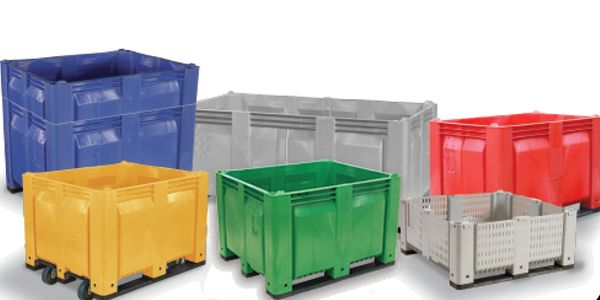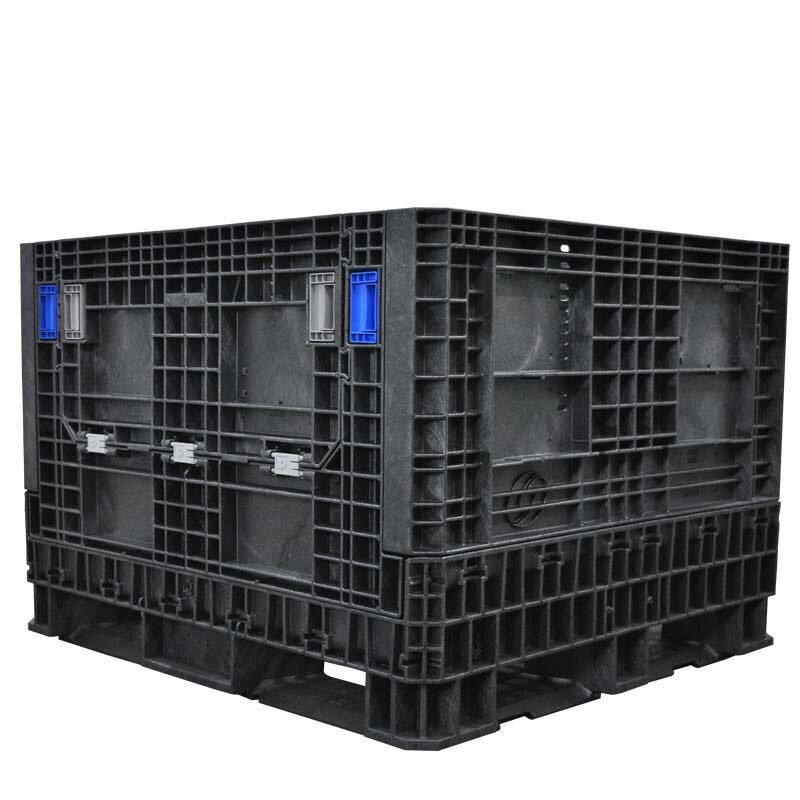How Bulk Plastic Containers can simplify your inventory management system
Wiki Article
A Comprehensive Guide to the Different Kinds Of Mass Plastic Containers Available Today
Bulk plastic containers play a critical function in numerous sectors, providing remedies for storage and transportation. Their varied types accommodate different requirements, from inflexible alternatives for solid materials to versatile containers fitting numerous shapes. Each kind offers distinct benefits, making it important to comprehend their attributes and applications. As markets progress, so do the needs for reliable container options. What aspects should one think about when choosing the best bulk container?Overview of Mass Plastic Containers

Sorts Of Mass Plastic Containers
Bulk plastic containers can be found in various types, each fit to specific applications. Stiff bulk containers, versatile mass containers, and intermediate bulk containers stand for the primary groups, each offering distinct advantages. Recognizing these kinds is necessary for selecting the ideal container for transferring and saving materials.
Inflexible Bulk Containers
Stiff bulk containers are vital for reliable storage space and transportation of various materials across markets. These containers are generally built from sturdy plastics, allowing them to stand up to rough handling and ecological problems. They are available in numerous sizes and shapes, consisting of containers, totes, and drums, making them suitable for saving every little thing from granular compounds to fluids. Inflexible containers typically include strengthened wall surfaces and safe and secure covers, ensuring the contents continue to be shielded throughout transit. Their stackable design takes full advantage of storage area, making them optimal for storage facilities and manufacturing centers. Furthermore, numerous rigid mass containers are recyclable and multiple-use, adding to sustainability efforts. Overall, their effectiveness and adaptability make rigid mass containers a crucial component in supply chain procedures.Versatile Bulk Containers
Adaptable bulk containers, often described as flexible intermediate mass containers (FIBCs), serve as a versatile remedy for saving a range and transporting of completely dry products. These containers are typically made from woven polypropylene and are made to be lightweight yet solid, enabling reliable handling and stacking. Their adaptability enables them to suit various forms and sizes, making them appropriate for items ranging from grains to chemicals. FIBCs can be equipped with functions such as spouts for easy dental filling and discharge, as well as protective coverings for enhanced resilience. In addition, they are recyclable and multiple-use, adding to lasting methods in industries such as farming, food processing, and construction. Overall, adaptable mass containers supply a effective and economical alternative for bulk product administration.Intermediate Bulk Containers
Intermediate bulk containers (IBCs) are necessary for the effective transportation and storage of liquids and granular products throughout different sectors. These containers generally have an ability ranging from 275 to 330 gallons and are made for easy stacking and dealing with. Made from durable materials like high-density polyethylene or steel, IBCs offer exceptional defense versus contamination and ecological variables. Their design consists of features such as a built-in pallet for forklift accessibility and a detachable top for easy dental filling and cleansing. IBCs are extensively made use of in chemical, food, and pharmaceutical fields, guaranteeing compliance with safety regulations. Their flexibility and reusability make them a cost-effective service for bulk storage and transport, adding to supply chain effectiveness and sustainability.Features and Advantages of Mass Plastic Containers
Mass plastic containers are vital tools in various industries, supplying a mix of longevity and usefulness. These containers are built from premium materials, making them immune to influences, chemicals, and ecological elements. This robustness warranties item security during storage and transport.In addition, bulk plastic containers are lightweight, helping with ease of minimizing and dealing with shipping prices. Their stackable style makes best use of storage performance, enabling optimized stockroom area. Numerous versions feature safe and secure lids or closures, providing an impermeable seal that preserves materials and stops contamination.
In addition, mass plastic containers are usually recyclable and recyclable, adding to sustainable methods. Their versatility enables a large range of applications, from food storage space to industrial usage, enhancing their worth throughout industries. Organizations benefit from the long life-span and reduced upkeep requirements of these containers, making them an economical service for both long-term and short-term needs.
Industries That Use Mass Plastic Containers
Numerous industries take advantage of the use of mass plastic containers, each leveraging their one-of-a-kind properties for specific applications. The food and beverage industry relies upon these containers for risk-free storage space and transportation of items, while the chemical production market utilizes them for dealing with dangerous materials. Additionally, the pharmaceutical distribution requires stress the importance of sturdiness and tidiness in product packaging remedies.Food and Beverage Market
As the demand for secure and reliable storage space options remains to increase, the food and beverage industry increasingly counts on mass plastic containers for their functional demands. These containers supply durable, light-weight, and flexible options for keeping components, finished items, and waste products. Made from food-grade materials, they guarantee conformity with wellness and safety criteria. that site Numerous styles, such as stackable bins and tote boxes, maximize area during transportation and storage space, boosting logistical effectiveness. Furthermore, the transparency of some bulk containers permits easy supply administration, reducing the threat of wasting. With the industry's emphasis on sustainability, lots of manufacturers are currently using multiple-use and recyclable choices, aligning with environmentally friendly techniques while satisfying the high needs of food security and hygiene.
Chemical Production Market
The chemical production industry relies greatly on mass plastic containers for the risk-free and effective storage space of raw materials, intermediates, and finished items. These containers are developed to withstand numerous chemicals, making certain that dangerous materials do not leak or deteriorate the container itself. Common types consist of high-density polyethylene (HDPE) and polypropylene containers, which supply excellent chemical resistance and durability. Their lightweight nature and stackable design assist in transportation and storage, maximizing room in manufacturing facilities. In addition, several mass plastic containers include features such as tamper-evident seals and easy-to-read labeling, improving safety and security and compliance with industry policies. Generally, mass plastic containers are indispensable to the chemical production process, offering trusted solutions for managing varied substances.Pharmaceutical Circulation Demands
Drug distribution depends on bulk plastic containers to satisfy rigorous safety and security and governing requirements. These containers are important for saving a selection and transporting of pharmaceutical products, including active pharmaceutical active ingredients (APIs) and ended up drugs. Their layout warranties defense versus contamination, dampness, and light, keeping the integrity of sensitive materials. In addition, mass plastic containers are certified with sector requirements such as Great Manufacturing Practices (GMP) and are typically made from materials that are FDA-approved. Using these containers enhances effectiveness in the supply chain, permitting safe, large-scale distribution while reducing waste. Firms in the pharmaceutical market focus on the use of resilient, watertight, and tamper-evident containers to assure item security and high quality throughout the logistics procedure.Factors to consider for Picking the Right Container
When picking the suitable bulk plastic container, numerous aspects should be thoroughly weighed to assure optimal functionality and hop over to here safety and security. The nature of the products to be stored is extremely important; compatibility with the container's product can influence honesty and security. plastic bulk containers. Furthermore, the container's shapes and size have to straighten with the storage and transportation requirements, assuring effective area usageTons capacity is another important consideration, as it should accommodate the weight of materials without danger of damage or failure. The design attributes, such as airing vent or lids, can influence functionality and access. Conformity with market regulations is important, particularly in industries like drugs, where safety standards are rigid.
Lastly, the anticipated life-span and toughness of the container should be assessed to verify it fulfills the functional requirements without regular substitute. By assessing these aspects, one can pick one of the most suitable bulk plastic container for certain applications.
Environmental Impact and Sustainability
As services significantly focus on sustainability, the ecological impact of mass plastic containers has actually come under examination. These containers, frequently made from materials such as polyethylene or polypropylene, add substantially to plastic waste otherwise taken care of properly. Their production involves the consumption of fossil fuels, which can cause raised greenhouse gas exhausts. Nonetheless, improvements in reusing modern technology and the growth of biodegradable options are assisting to reduce these issues.In addition, lots of manufacturers are taking on methods that emphasize using recycled products, thus decreasing the need for virgin plastics. The durability of mass plastic containers also contributes; they are designed to be recycled several times, which can lessen their total environmental impact when contrasted to single-use alternatives. Eventually, the market faces the difficulty of balancing capability with ecological duty, making sustainable techniques linked here vital for the future of mass plastic containers.
Finest Practices for Storage Space and Transportation
Reliable storage and transport of bulk plastic containers substantially affect both operational performance and sustainability. To make the most of space, companies should stack containers firmly, ensuring security and avoiding damages. Proper labeling is crucial for simple recognition, which simplifies retrieval processes. Furthermore, keeping a well organized and clean storage location reduces the danger of contamination and boosts safety.For transportation, picking the right car is crucial; containers need to be secured to prevent moving throughout transportation. Firms should likewise think about making use of pallets to facilitate easier loading and unloading. Normal inspections of containers for wear and tear can prevent costly replacements.
Temperature control is another crucial element, as severe problems can endanger the honesty of the plastic. Ultimately, training employees on best practices for handling and transportation assurances compliance and promotes a culture of safety. By implementing these best techniques, organizations can boost their functional performance while adding to ecological sustainability.
Often Asked Questions
How Do I Tidy Mass Plastic Containers Successfully?
To clean mass plastic containers successfully, one ought to rinse them with cozy water, make use of a moderate detergent and scrub with a soft brush. Rinse extensively, after that allow to air completely dry totally before storage space or reuse.What Is the Life-span of Mass Plastic Containers?
The life expectancy of bulk plastic containers usually ranges from 5 to one decade, depending upon the product, usage, and environmental problems. Proper upkeep and storage can substantially prolong their functionality and sturdiness over time.Can Mass Plastic Containers Be Customized?

Do Mass Plastic Containers Have Warranty Options?

Are There Laws for Utilizing Mass Plastic Containers?
Yes, guidelines exist for making use of mass plastic containers, primarily concentrated on safety, environmental effect, and material compliance. These guidelines ensure that containers satisfy sector criteria and appropriate for transporting various substances safely and efficiently.Rigid mass containers, adaptable mass containers, and intermediate mass containers stand for the key groups, each offering one-of-a-kind benefits. Adaptable bulk containers, typically referred to as versatile intermediate bulk containers (FIBCs), serve as a versatile remedy for transporting and saving a variety of completely dry materials. The chemical manufacturing sector counts heavily on mass plastic containers for the risk-free and efficient storage of raw products, intermediates, and finished items. Bulk Plastic Containers. These containers are made to endure numerous chemicals, making sure that harmful materials do not leakage or break down the container itself. Additionally, mass plastic containers are certified with market standards such as Excellent Manufacturing Practices (GMP) and are frequently made from products that are FDA-approved
Report this wiki page